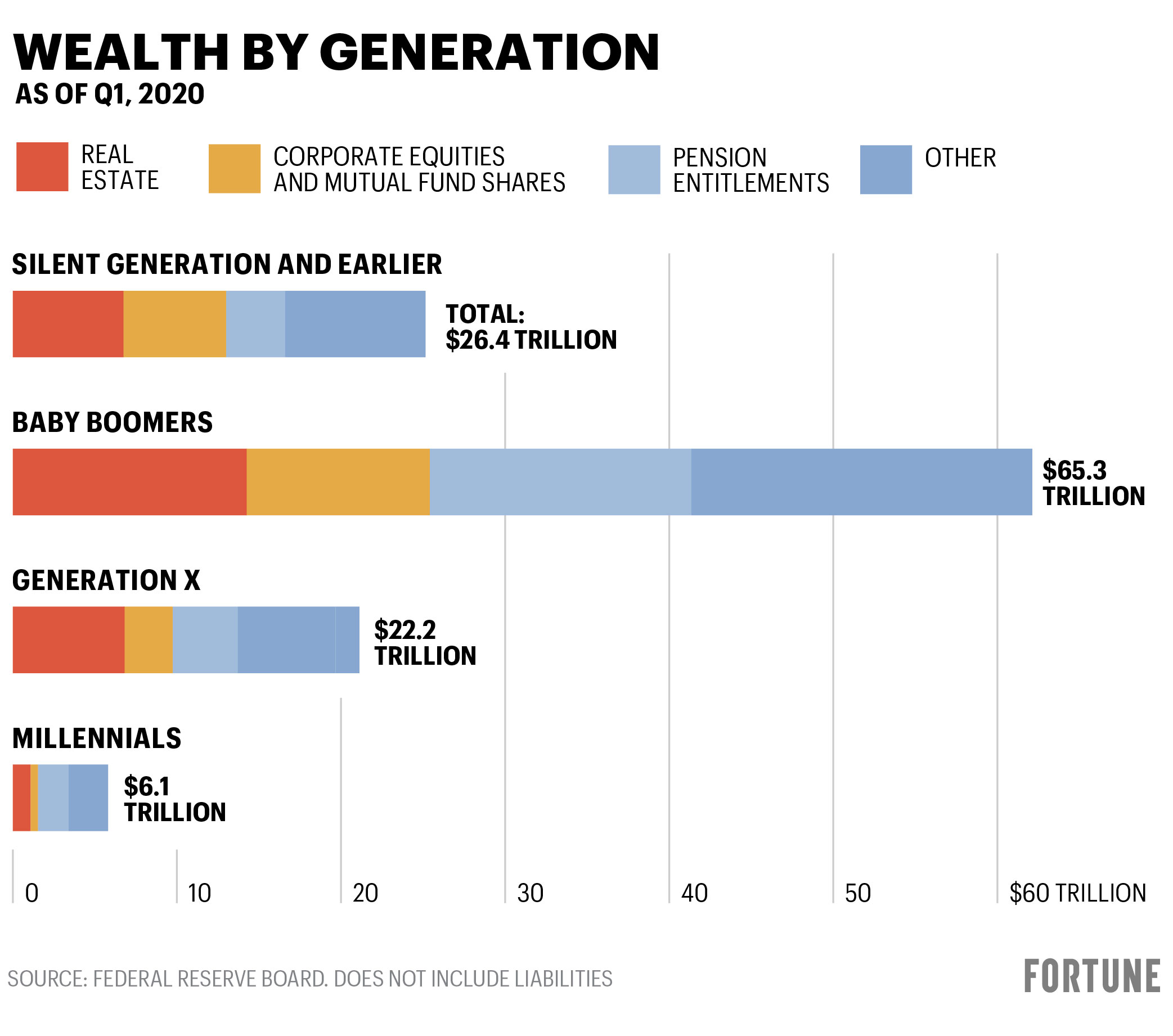音樂、時尚和政治等領域的代際分歧由來已久,而現在房地產領域的代際差異也在日漸擴大。
如下圖所示,自20世紀90年代開始,每代人在房地產上的投資金額及相應的投資價值都出現了巨大分化。代際問題專家稱,盡管這一現象與運氣和時機不無關系,但也深深塑造了每一代人對擁有住房的整體感受。


代際動力學中心(Center for Generational Kinetics)是一家位于奧斯汀的研究與戰略公司,該公司的總裁兼代際研究負責人杰森?多爾西表示,這種現象是多種因素共同作用的結果。這些因素不僅影響了每代人可支配財富的多寡,也影響了他們在支出上的選擇。
?Z世代:如果你以為Z世代只關心零工和租賃經濟,那就大錯特錯了。多爾西說:“大衰退時,Z世代已經開始記事,而且年齡尚小,價值觀很容易受到影響。他們曾經耳聞目睹父輩的掙扎以及失業的痛楚。”多爾西認為,總體而言,Z世代在財務上偏于保守,對借貸和負債態度偏懷疑,他們喜歡從事有穩定福利的工作,并且更有可能使用鼓勵儲蓄或能提高信用分數的應用。他說:“我們稱Z世代為‘倒退的一代’,他們在很多方面真的更像‘嬰兒潮’一代。” 房地美近期進行的一項調查也支持該觀察。調查顯示,86%的Z世代受訪者表示“希望未來能擁有自己的房產”,且平均估計“能在30歲前實現,比當前的房產購置中位年齡(33歲)早三年。”通過與之前的調查進行比較,房地美發現:“與千禧一代相同年紀時相比,年齡在18至23歲的Z世代成員中,認為租房比購房更有吸引力、租房能獲得歸屬感、租房比持有房產成本更低的比例都更低,比例分別為19%對30%、33%對39%和40%對51%。”
?千禧一代:千禧一代并不是不想擁有自己的房子,不過趕上大衰退對經濟造成嚴重沖擊,成家立業只得推遲。許多人大學畢業后找不到理想的工作,或因為經濟環境不佳而從事低薪工作,還有人連工作都找不到。再加上教育成本的大幅提升,這一代人還背著非常沉重的學生貸款債務。皮尤研究中心對人口普查數據的分析顯示,“與前幾代人同年齡時相比,千禧一代在三大家庭生活指標——購房成家比例、結婚率和生育率方面都偏低”。皮尤研究發現,2019年,在千禧一代中,有55%住在自有房屋里。而2003年,在X世代中,這一比例為66%;1987年時,嬰兒潮一代中這一比例為69%;1968年,沉默的一代中這一比例為85%。新冠疫情爆發前,千禧一代剛剛掀起一波置業潮,但就在他們即將購買第一套住房時,就遭逢疫情打擊。
?X世代:X世代對房產的態度主要取決于自己所處地區房價是否已經從大衰退中完全恢復。如果房價恢復了,那么他們往往會將購置房產當作積累財富的一種積極手段,反之則更偏向于看空房產。多爾西表示,“房產的兩面——快速升值和崩盤,X世代都經歷過了。”
?嬰兒潮一代:嬰兒潮一代往往會毫不掩飾地將房地產視為一種投資,認為房產既能創造財富,也能保值增值。這就引出了另一個有趣的代際傳承問題:千禧一代能否通過從嬰兒潮一代的父母那里繼承巨額財富來實現經濟上的躍升?雖然很多人早已對此作出預言,但多爾西卻認為這種情況未必會真的出現。他說:“嬰兒潮一代都很長壽,養老會花去很多積蓄,也就無法給孩子留下太多的財產。”
?沉默的一代:多爾西稱,這代人與后幾代有著截然不同的人生經歷,“他們都親歷了二戰后郊區快速發展的時期。作為嬰兒潮一代的父母,他們見證了農村的城市化進程,也見證了城市的興衰起伏。”他表示,這代人越來越傾向于給自己的房產做減法,減少自己的家務負擔。換句話說,就是搬到空間小一點或更易維護的地方居住。在設法“保持生活品質、獲取醫療服務以及與親朋好友比鄰而居”的同時,他們也在做遺產繼承方面的規劃。(財富中文網)
譯者:Feb
音樂、時尚和政治等領域的代際分歧由來已久,而現在房地產領域的代際差異也在日漸擴大。
如下圖所示,自20世紀90年代開始,每代人在房地產上的投資金額及相應的投資價值都出現了巨大分化。代際問題專家稱,盡管這一現象與運氣和時機不無關系,但也深深塑造了每一代人對擁有住房的整體感受。
圖:截至2020年第一季度,各代人所掌握的財富。
圖:1990-2020年,各代人所掌握的房產財富。
代際動力學中心(Center for Generational Kinetics)是一家位于奧斯汀的研究與戰略公司,該公司的總裁兼代際研究負責人杰森?多爾西表示,這種現象是多種因素共同作用的結果。這些因素不僅影響了每代人可支配財富的多寡,也影響了他們在支出上的選擇。
? Z世代:如果你以為Z世代只關心零工和租賃經濟,那就大錯特錯了。多爾西說:“大衰退時,Z世代已經開始記事,而且年齡尚小,價值觀很容易受到影響。他們曾經耳聞目睹父輩的掙扎以及失業的痛楚。”多爾西認為,總體而言,Z世代在財務上偏于保守,對借貸和負債態度偏懷疑,他們喜歡從事有穩定福利的工作,并且更有可能使用鼓勵儲蓄或能提高信用分數的應用。他說:“我們稱Z世代為‘倒退的一代’,他們在很多方面真的更像‘嬰兒潮’一代。” 房地美近期進行的一項調查也支持該觀察。調查顯示,86%的Z世代受訪者表示“希望未來能擁有自己的房產”,且平均估計“能在30歲前實現,比當前的房產購置中位年齡(33歲)早三年。”通過與之前的調查進行比較,房地美發現:“與千禧一代相同年紀時相比,年齡在18至23歲的Z世代成員中,認為租房比購房更有吸引力、租房能獲得歸屬感、租房比持有房產成本更低的比例都更低,比例分別為19%對30%、33%對39%和40%對51%。”
? 千禧一代:千禧一代并不是不想擁有自己的房子,不過趕上大衰退對經濟造成嚴重沖擊,成家立業只得推遲。許多人大學畢業后找不到理想的工作,或因為經濟環境不佳而從事低薪工作,還有人連工作都找不到。再加上教育成本的大幅提升,這一代人還背著非常沉重的學生貸款債務。皮尤研究中心對人口普查數據的分析顯示,“與前幾代人同年齡時相比,千禧一代在三大家庭生活指標——購房成家比例、結婚率和生育率方面都偏低”。皮尤研究發現,2019年,在千禧一代中,有55%住在自有房屋里。而2003年,在X世代中,這一比例為66%;1987年時,嬰兒潮一代中這一比例為69%;1968年,沉默的一代中這一比例為85%。新冠疫情爆發前,千禧一代剛剛掀起一波置業潮,但就在他們即將購買第一套住房時,就遭逢疫情打擊。
? X世代:X世代對房產的態度主要取決于自己所處地區房價是否已經從大衰退中完全恢復。如果房價恢復了,那么他們往往會將購置房產當作積累財富的一種積極手段,反之則更偏向于看空房產。多爾西表示,“房產的兩面——快速升值和崩盤,X世代都經歷過了。”
? 嬰兒潮一代:嬰兒潮一代往往會毫不掩飾地將房地產視為一種投資,認為房產既能創造財富,也能保值增值。這就引出了另一個有趣的代際傳承問題:千禧一代能否通過從嬰兒潮一代的父母那里繼承巨額財富來實現經濟上的躍升?雖然很多人早已對此作出預言,但多爾西卻認為這種情況未必會真的出現。他說:“嬰兒潮一代都很長壽,養老會花去很多積蓄,也就無法給孩子留下太多的財產。”
? 沉默的一代:多爾西稱,這代人與后幾代有著截然不同的人生經歷,“他們都親歷了二戰后郊區快速發展的時期。作為嬰兒潮一代的父母,他們見證了農村的城市化進程,也見證了城市的興衰起伏。”他表示,這代人越來越傾向于給自己的房產做減法,減少自己的家務負擔。換句話說,就是搬到空間小一點或更易維護的地方居住。在設法“保持生活品質、獲取醫療服務以及與親朋好友比鄰而居”的同時,他們也在做遺產繼承方面的規劃。(財富中文網)
譯者:Feb
There has long been a generational divide when it comes to music, fashion, and politics…but there’s also a growing generational gap when it comes to real estate.
As the charts below show, starting in the 1990s, both the amounts each generation has invested in real estate, as well as the value of those investments, have differed dramatically. And generational experts say that while some of this has to do with luck and timing—those factors have also shaped each generation’s overall feelings about owning a home.
There are a few factors at work here, says Jason Dorsey, president and lead generational researcher at the Center for Generational Kinetics, a research and strategy firm based in Austin. And they affect not just how much each generation has to spend, but what each is spending it on.
? Gen Z: If you think Gen Z is all about gig jobs and the rental economy, you couldn’t be more mistaken. Says Dorsey: “Gen Z was old enough to remember the Great Recession, but young enough to have it change their views. They saw and heard their parents struggle, lose their jobs.” Broadly speaking, Dorsey says, members of Gen Z skew conservative financially and tend to have a more skeptical attitude toward credit and debt, seek jobs with stable benefits, and are much more likely to use apps that encourage saving or improving their credit scores. “We call Gen Z a throwback generation,” Dorsey says. “In many ways they are really like baby boomers.” A recent Freddie Mac survey backs that up, finding that 86% of Gen Z respondents want to own a home someday, and estimating on average that they will “attain this goal by the time they turn 30 years old, three years younger than the current median homebuying age (33).” Compared with previous surveys, Freddie Mac found that “fewer 18- to 23-year-old members of Gen Z see renting as more appealing than buying a home, versus millennials at the same age (19% to 30%); fewer believe renting makes you feel like part of a community (33% to 39%); and fewer perceive that it costs less to rent a home than to own a home (40% to 51%)."
? Millennials: It’s not that millennials don’t want to own homes, but given the economic wallop of the Great Recession, their passage through adulthood has been pushed back. Many emerged from college unable to find jobs, settled for jobs that weren’t ideal, or took lower-paying jobs because of the state of the economy. Not to mention this is a generation carrying very high loads of student loan debt, given the explosion in higher ed costs. According to analysis of Census data by the Pew Research Center, “Millennials trail previous generations at the same age across three typical measures of family life: living in a family unit, marriage rates, and birth rates.” They found that in 2019, 55% of millennials lived in a family unit. This compares with 66% of Gen Xers in 2003, 69% of boomers in 1987, and 85% of members of the Silent Generation in 1968. Though millennials had just started to power a buying boom before COVID-19, they were hit with another blow just as many would have been on the verge of buying their first home.
? Gen X: Meanwhile, when it comes to Gen Xers, their experience with real estate tends to center on whether they are in an area where prices have fully recovered from the Great Recession. If they have, they generally view it as a positive way to build wealth. But if not they hold more negative views. Says Dorsey, “They’ve seen the good and bad—the rapid appreciation and the crash.”
? Boomers: If you’re a boomer, you tend to have an unabashedly positive view of real estate as an investment, thinking of it as a wealth creation vehicle as well as a nest egg. Which leads to another interesting generational twist: Will millennials be able to play financial catch-up via a huge wealth transfer from their boomer parents? Though that has long been what’s predicted, Dorsey isn’t so sure anymore. “Boomers are living so long they may end up spending what they would have given to their kids,” he says.
? The Silent Generation: They have a very different experience than later generations, says Dorsey, "because they were there during the rapid growth of the suburbs post-World War II. As the parents of boomers, they witnessed farmland become master-planned communities. They also saw the fortunes of cities rise and fall and rise again." He says that this group is increasingly trying to simplify their real estate and homeownership responsibilities—i.e. moving into a smaller place or one that is easier to maintain. They're also navigating inheritance and estate planning, while figuring out how to "maintain their quality of life, access to healthcare, and proximity to other family members and friends," says Dorsey.






